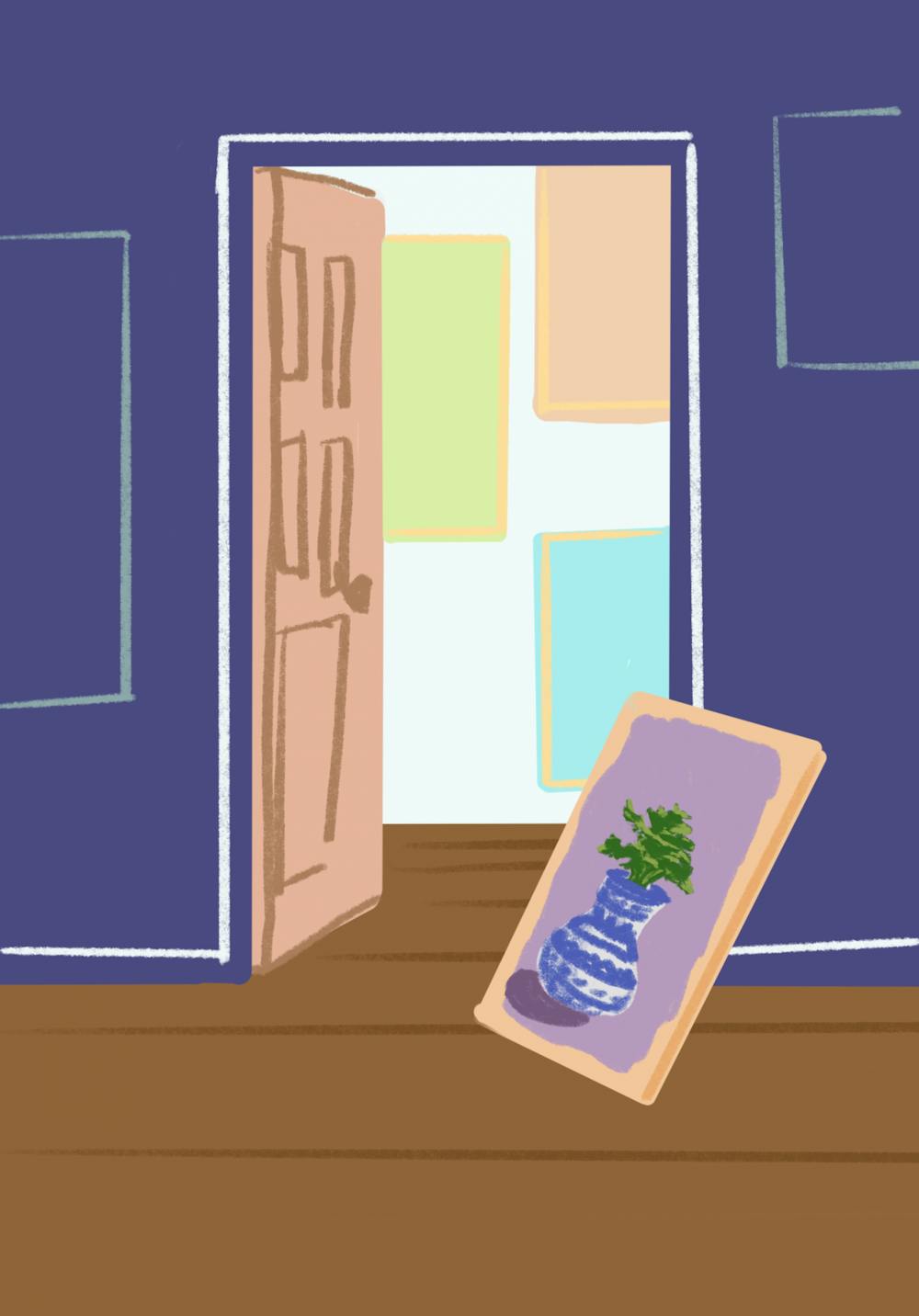할머니 paints, but her paintings never really leave the apartment. There must be over 40 canvases scattered around, propped up on the floor in sets of three or four so you can sort through them like vinyl in a record shop. I discover six older ones I’ve never seen before when I follow her to her bathroom to grab a band-aid.
She thinks of her paintings as unfinished, but to everyone else, they are masterpieces. You could walk into her apartment and think you stumbled into an art collector’s home—too many pieces and not enough space. Then, you would walk along the perimeter of the living room, squatting low to look at each canvas. When you were done, you would have seen summertime in Rome, reached the summit of rugged mountains sprawling with wild fauna, caught cows lazily grazing under the shade of drooping boughs, and floated at sea just as the sun hits shimmering water.
The first time I was in Korea, I spent four months there. Every time I made my way to my grandmother’s home, I hoped she was busy and didn’t have time to tidy up. That way, I’d walk into the living room and catch her with the easel—paint cans, tubes, and brushes scattered around her. Classical music would be pouring from the speakers and I would catch a glimpse of the painter. I’d tell her I want to watch her work—watch her paint shadows that make me stare for hours wondering how she ever transformed the paint into a photograph, watch her move her brush across the canvas the way she sews the hole in my sock: without much thought, swiftfully and instinctively. But she’d only laugh as if I am just flattering her and don’t mean it (I do).
But whenever I entered, the room was always ordinary and clean: her denim apron folded neatly on the couch, pillows fluffed, and a meal ready for me on the table. It was set for one (maybe two if my grandfather was joining) because 할머니 never ate with me. Instead she shuffled around the house, sprinkling love from one thing to the next: watering the plants, checking if I wanted more of anything (everything was bountiful so I never did), bringing me cut fruit regardless. Sometimes, during dinner, I would catch her holding a ripped-out magazine page with dollops of paint in one hand and a paintbrush in the other. She would slip behind the bedroom door, and I’d follow, leaning against the door a few feet behind her, quietly watching her refine something with her brush. Then she would turn around, see that I was watching, and hurry me back to my seat.
My grandmother’s masterpieces stay contained within Apt. #2304. I've always wondered why she doesn't showcase her paintings, why she stays hidden behind the bedroom door, why she doesn't sign her paintings, why she never finishes them.
I want to ask her more. I want to know how she keeps her passion alive and for her to show me her recent paintings and to tell me about the new techniques she’s been using.
What inspires you? How do you begin a painting? Where do you begin? What do you love most about it? Do you love it? Does it bring you joy? Peace? Where do you feel it? In your hands, or chest, or head, or is it all over like water swirling and swishing underneath your skin? What else makes you feel like that?
We call her after dinner. We use Dad’s phone and let it ring on the table as I bring plates to the sink. 할머니 answers and Dad picks up the phone to start us off. I shadow him as Korean finds its natural rhythm on his tongue and the two bounce questions and answers off each other. I admire it and find myself repeating the sentences in my head, trying to do it without skipping or mumbling over syllables. Calling 할머니 is always easier when I have Mom and Dad near me, so if I manage to use up all the fluent Korean that I was able to download in my brain beforehand, I can pass off the phone for a minute and try to load a little more.
It’s my turn afterwards. We arrive at the topic of dinner because at least I can say we ate spring rolls tonight and name the ingredients, animatedly and theatrically. She tells me that cilantro has been expensive lately in Korea, but the other day, she was having a good day and felt happy, so she bought a bunch at the store. She’s been eating it every day with each meal, and 할아버지 doesn’t like cilantro but that’s totally fine; she cooks something separate for him and then eats her own thing (with cilantro).
할머니, did you know there’s such a thing as a cilantro gene? Some people are just genetically wired to have an aversion to cilantro—it tastes like soap to them. Maybe 할아버지 has that. You should ask if cilantro tastes like soap to him. What have you been cooking recently? I crave your cooking. I’m moving into a home next year where I’ll have a full kitchen. Will you teach me some of your recipes? I always miss (your) Korean food whenever I’m not home.
I laugh out loud because Mom is too elbow-deep in dishes for me to explain the cilantro gene to her, and then for her to explain the cilantro gene to 할머니.
I wrap around to Mom’s right side and use one hand to put the camera in her face. I ask her to ask 할머니 for me if she’s tried growing her own cilantro (I am blanking on what suffix to add in order to form a question). Mom does, and 할머니 says she’s already tried, but the scent and pungency is weaker so it’s not as good.
할머니, of course you’ve already thought to grow your own cilantro. How do you do it? Somehow, with any problem, you always have a solution. Even if I have one of my own, yours is better, more efficient, easier. You work smarter than anyone I know and I wish I could just observe the way you live and take notes. Come to the states and visit us, won’t you? I miss you and love you.
Oh well, says Mom. I guess you do need to buy cilantro then. We move on and ask about 할아버지.
She tells me that 할아버지 needs to grow his patience, and patience is an important virtue we should have.
Do you remember when we waited in the car while 할아버지 went inside to grab some CD from inside? We played with the music for a second, made jokes about the people we saw passing by, and then you started talking the way you do when your thoughts just flow out of you like a faucet. You told me: do what you love, be with the person you love. You said things that people have told me before, but somehow I listened as if it was the first time. Every memory with you leaves a scent of sweetness.
I respond with a generous head nod to show I understand.
I ask to see what she’s been working on most recently (my favorite part of every call). She moves her camera to show her recent working canvases and I can’t help but use all the Korean adjectives I know to describe beauty within the first two paintings. I try to get her to slow down, but she darts the camera around quickly and casually as if I’ve asked yet again to see her growing plants that I’ve already seen a hundred times.
That shadow. Wait, stop. Zoom in. How did you add color here to remove space? How did this paint dry and create movement instead? What was this before it was the delicate glow of a summer evening sun poking through the whispering leaves of the tree?
All I can offer are gasps of disbelief.
할머니 tells me she paints the way I tell her I love her: translated and exact with no uncertain terms. So as we end the call, I say those three words, “사랑해요 할머니”, letting it hold all the awe and praise and wonderment and respect I have for her. And she says it back to me.
When I speak to 할머니, I fumble through my words, and the ends of my sentences mostly slow down and taper into questions. There is a kind of heartache that stirs deep within me, pangs of guilt realizing that I do not know how to say the majority of the questions I set out to ask.
And yet, I can’t help but feel that we might be okay. I think we can read and write and speak this language: the one where her living room is neat and tidy but passion bleeds into the fabric of the couches and spills all over the floors and the walls, and the one where I tell her that I biked to the store today and bought groceries and that I will cook curry tonight, the one where I will ask to see her new paintings and marvel at how they are beautiful, and beautiful, and that one too, is beautiful.
I love you, I love you, I love you.





